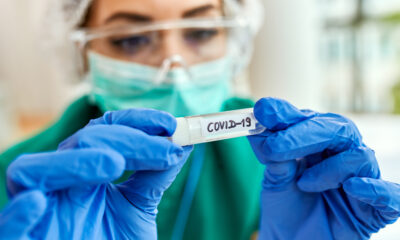
OpEds

No evidence that COVID-19 vaccines cause infertility
Fighting misinformation and a pandemic is taxing. However, it doesn’t help for Reform UK leader Richard Tice to make misleading claims about COVID-19 vaccines and fertility.
In a widely shared and now-deleted tweet posted on 19 July, Tice claimed that “forcing” young women to have the COVID-19 vaccine is “almost certain” to lead to “increased stillbirths, miscarriages, disabled children, and infertility”. There’s no evidence to support his claim.
There’s no evidence that new vaccines against COVID-19 cause infertility, yet that’s a worry that’s been cited by some healthcare workers as a reason why they’re reluctant to be first in line to get the shots.
Unfortunately, there was already a bunch of people out there saying there’s no such thing as COVID-19. “It’s no worse than the flu,” said some. Many of these people gained substantial followings for themselves on social media. When the vaccines came along, they used these platforms to stir up conspiracy theories.
Claims that the vaccine can affect a woman’s fertility due to the generation of the spike protein have been circulating since the start of the rollout of the vaccine.
In early December 2020, a German doctor and epidemiologist named Wolfgang Wodarg, who has been sceptical about the need for vaccines during other pandemics, teamed up with a former Pfizer employee to ask the European Medicines Agency (the European Union counterpart to the United States Food and Drug Administration) to delay the study and approval of the Pfizer/BioNTech vaccine.
One of their concerns was a protein called syncytin-1, which shares similar genetic instructions to part of the spike of the new coronavirus. That same protein is an important component of the placenta in mammals.
If the vaccine causes the body to make antibodies against syncytin-1, they argued, it might also cause the body to attack and reject the protein in the human placenta, making women infertile.
Their petition was picked up by anti-vaccination blogs and websites, and posted on social media. Facebook eventually removed posts about the petition from its site for spreading misinformation.
The idea that vaccines could be deployed for population control was also woven into the plot of a recent, fictional mini-series on Amazon Prime Video called Utopia. In that show, a drug maker obsessed with population control creates the illusion of a flu pandemic to convince people to take its vaccine, which doesn’t prevent infection but acts against human reproduction.
A spokesperson for Amazon Studios says the series is pure fiction.
The coronavirus’s spike protein and syncytin-1 share small stretches of the same genetic code, but not enough to make them a match. This is like two people having phone numbers that both contain the number 7. You couldn’t dial one number to reach the other person even though their phone numbers share a digit.
Looking at the two largest systems currently monitoring adverse reactions to COVID-19 vaccines, the Medicines and Healthcare Products Regulatory Agency (MHRA) in the United Kingdom, and the Vaccine Adverse Event Reporting System in the United States rely on voluntary reporting from medics and members of the public, and are intended to provide early warning of any previously unknown risks.
There is no evidence that COVID-19 vaccines affect fertility. The Pfizer/BioNTech and Moderna vaccines have been widely used during pregnancy in other countries and no safety concerns have been identified. Evidence reviewed by the MHRA has raised no specific concerns about safety in pregnancy.
The Royal College of Obstetricians and Gynaecologists states on its website: “COVID-19 vaccines don’t contain ingredients that are known to be harmful to pregnant women or to a developing baby.” It goes on to say that studies of the vaccines in animals to look at effects on pregnancy have shown no evidence that the vaccine causes harm to the pregnancy or to fertility.
It’s clear that getting the COVID-19 vaccine won’t affect your fertility. Women actively trying to conceive may be vaccinated with current COVID-19 vaccines. There’s no reason to delay pregnancy after completing the vaccine series.
Importantly, COVID-19 can be severe in pregnant women. The Centre for Disease Control includes pregnant women as a high-risk group for severe COVID-19 illness, therefore we need to see pregnancy as a comorbidity for COVID-19.
Therefore, getting vaccinated against coronavirus is an important consideration for pregnant women. Recent data report an increased risk of intensive-care admission, the need for mechanical ventilation and ventilator support, and both intra-uterine foetal death and death in pregnant women with symptomatic COVID-19.
We can gain perspective by looking at the available statistics. By January 2021, consider that more than 22 million people in the United States had been infected by SARS-CoV-2. In fact, experts believe that number is much higher because 22 million is just the number tested and found positive.
Most think the real number is at least three times that. Therefore, consider that 70 million Americans have been infected, or about 20% of the population. If the infertility theory was true, we would expect that the body making antibodies against natural infection would show up in the fertility statistics. It hasn’t.
The incidence of infertility in any population is one in seven couples. There is no evidence that this pandemic has changed fertility patterns, so if the raw viral illness doesn’t appear to affect fertility, why should vaccination do so?
Although there’s no reason to believe that the vaccine poses a risk to women who are pregnant or are trying to conceive, there is evidence about the danger of COVID-19 infection for pregnant women, which is a reason we should embrace rather than avoid vaccination.
Pregnant women get sicker when they get COVID-19 compared with other people their age, and pregnant women with COVID-19 are more likely to experience pre-term delivery. The effect of COVID-19 disease on pregnancy is real, and it’s important to prevent it.
A recently published peer-reviewed journal article discusses the potential negative impact of the COVID-19 disease on testicular function, sperm production, and male fertility.
Some studies have shown that the SARS-COV-2 virus has been found in the sperm of men with COVID-19 infection, and it may have an impact on the male hormones necessary for normal sperm production. Also, there are numerous reports of men with testicular or scrotal pain after getting COVID-19.
Men who are worried about their fertility should probably get the COVID-19 vaccine as there are some concerns about the potential effect of COVID-19 disease – but not the vaccine – on male fertility.
In all the data thus far, we don’t see any increased risk of developing infertility, either in the near or distant future, with getting these vaccines.
We need to get everyone vaccinated as soon as possible, otherwise we’re going to completely muddle through an ongoing pandemic.
This article doesn’t replace the option of discussing COVID-19 and vaccination with your primary healthcare provider.
- Dr Lawrence Gobetz is a reproductive medicine specialist and the medical director of Vitalab, a centre for assisted conception.










